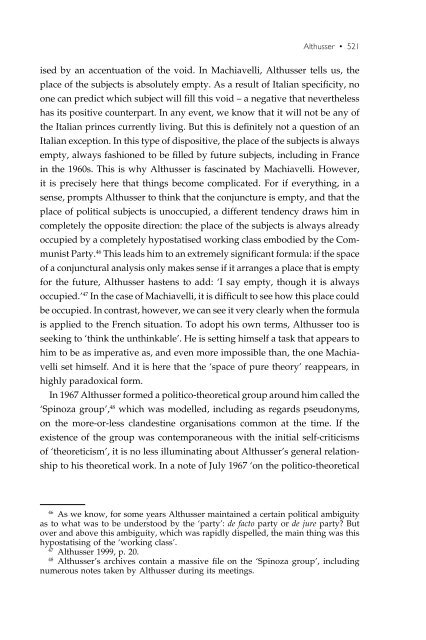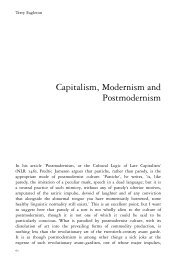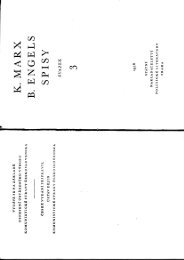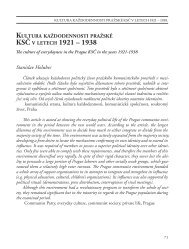- Page 2 and 3:
Critical Companion to Contemporary
- Page 4 and 5:
Critical Companion to Contemporary
- Page 6 and 7:
Contents Introduction: Marxism, Pos
- Page 8 and 9:
Contents • vii Chapter Eighteen B
- Page 10:
Chapter Thirty-Nine Kôzô Uno and
- Page 13 and 14:
xii • Jacques Bidet and Stathis K
- Page 15 and 16:
xiv • Jacques Bidet and Stathis K
- Page 18:
Pre� gurations
- Page 21 and 22:
4 • Jacques Bidet set gradually t
- Page 23 and 24:
6 • Jacques Bidet domination, hol
- Page 25 and 26:
8 • Jacques Bidet All this can be
- Page 27 and 28:
10 • Jacques Bidet versa. Such, i
- Page 29 and 30:
12 • Jacques Bidet are already tr
- Page 31 and 32:
14 • Jacques Bidet of the capital
- Page 33 and 34:
16 • Jacques Bidet ‘state syste
- Page 35 and 36:
18 • Jacques Bidet what modern so
- Page 37 and 38:
20 • Jacques Bidet More precisely
- Page 40 and 41:
Chapter Two The Crises of Marxism a
- Page 42 and 43:
The Crises of Marxism • 25 whethe
- Page 44 and 45:
The Crises of Marxism • 27 orthod
- Page 46 and 47:
The Crises of Marxism • 29 crisis
- Page 48 and 49:
The Crises of Marxism • 31 commen
- Page 50 and 51:
The Crises of Marxism • 33 the ne
- Page 52 and 53:
The Crises of Marxism • 35 lowing
- Page 54 and 55:
The Crises of Marxism • 37 while
- Page 56 and 57:
Chapter Three The Development of Ma
- Page 58 and 59:
The Development of Marxism in Franc
- Page 60 and 61:
The Development of Marxism in Franc
- Page 62 and 63:
The Development of Marxism in Franc
- Page 64 and 65:
The Development of Marxism in Franc
- Page 66 and 67:
The Development of Marxism in Franc
- Page 68 and 69:
The Development of Marxism in Franc
- Page 70 and 71:
The Development of Marxism in Franc
- Page 72 and 73:
The Development of Marxism in Franc
- Page 74 and 75:
The Development of Marxism in Franc
- Page 76 and 77:
The Development of Marxism in Franc
- Page 78 and 79:
The Development of Marxism in Franc
- Page 80 and 81:
The Development of Marxism in Franc
- Page 82 and 83:
The Development of Marxism in Franc
- Page 84 and 85:
The Development of Marxism in Franc
- Page 86 and 87:
The Development of Marxism in Franc
- Page 88 and 89:
The Development of Marxism in Franc
- Page 90 and 91:
The Development of Marxism in Franc
- Page 92 and 93:
The Development of Marxism in Franc
- Page 94 and 95:
The Development of Marxism in Franc
- Page 96 and 97:
Chapter Four Whither Anglo-Saxon Ma
- Page 98 and 99:
Western Marxism and the 1960s gener
- Page 100 and 101:
Whither Anglo-Saxon Marxism? • 83
- Page 102 and 103:
Whither Anglo-Saxon Marxism? • 85
- Page 104 and 105:
Whither Anglo-Saxon Marxism? • 87
- Page 106 and 107:
Is Marxism ‘over’? Whither Angl
- Page 108 and 109:
Whither Anglo-Saxon Marxism? • 91
- Page 110 and 111:
Whither Anglo-Saxon Marxism? • 93
- Page 112 and 113:
Chapter Five Old Theories and New C
- Page 114 and 115:
A new phase of capitalism Old Theor
- Page 116 and 117:
Old Theories and New Capitalism •
- Page 118 and 119:
Old Theories and New Capitalism •
- Page 120 and 121:
Old Theories and New Capitalism •
- Page 122 and 123:
Old Theories and New Capitalism •
- Page 124 and 125:
Old Theories and New Capitalism •
- Page 126 and 127:
Old Theories and New Capitalism •
- Page 128 and 129:
Old Theories and New Capitalism •
- Page 130 and 131:
Old Theories and New Capitalism •
- Page 132 and 133:
Old Theories and New Capitalism •
- Page 134 and 135:
Old Theories and New Capitalism •
- Page 136:
Old Theories and New Capitalism •
- Page 140 and 141:
Chapter Six Analytical Marxism Chri
- Page 142 and 143:
Analytical Marxism • 125 In what
- Page 144 and 145:
Analytical Marxism • 127 be found
- Page 146 and 147:
Analytical Marxism • 129 respect;
- Page 148 and 149:
Analytical Marxism • 131 producti
- Page 150 and 151:
Analytical Marxism • 133 ogy. His
- Page 152 and 153:
Analytical Marxism • 135 ism, ana
- Page 154 and 155:
Analytical Marxism • 137 in recen
- Page 156 and 157:
Analytical Marxism • 139 This ‘
- Page 158:
Analytical Marxism • 141 nection
- Page 161 and 162:
144 • Gérard Raulet (economics,
- Page 163 and 164:
146 • Gérard Raulet It was doubt
- Page 165 and 166:
148 • Gérard Raulet During the i
- Page 167 and 168:
150 • Gérard Raulet Nietzsche’
- Page 169 and 170:
152 • Gérard Raulet potential fo
- Page 171 and 172:
154 • Gérard Raulet The principl
- Page 173 and 174:
156 • Gérard Raulet empirical re
- Page 175 and 176:
158 • Gérard Raulet Succeeding t
- Page 177 and 178:
160 • Gérard Raulet Foucault mis
- Page 180 and 181:
Chapter Eight The Late Lukács and
- Page 182 and 183:
The Late Lukács and the Budapest S
- Page 184 and 185:
The Late Lukács and the Budapest S
- Page 186 and 187:
The Late Lukács and the Budapest S
- Page 188 and 189:
The Late Lukács and the Budapest S
- Page 190:
The Late Lukács and the Budapest S
- Page 193 and 194:
176 • Michel Husson the other, by
- Page 195 and 196:
178 • Michel Husson estranged fro
- Page 197 and 198:
180 • Michel Husson on the one ha
- Page 199 and 200:
182 • Michel Husson can always fu
- Page 201 and 202:
184 • Michel Husson however, they
- Page 203 and 204:
186 • Michel Husson On the other
- Page 205 and 206:
188 • Michel Husson Thus, the cyc
- Page 207 and 208:
190 • Jean-Marie Harribey The sec
- Page 209 and 210:
192 • Jean-Marie Harribey Society
- Page 211 and 212:
194 • Jean-Marie Harribey ecologi
- Page 213 and 214:
196 • Jean-Marie Harribey and a f
- Page 215 and 216:
198 • Jean-Marie Harribey argumen
- Page 217 and 218:
200 • Jean-Marie Harribey which m
- Page 219 and 220:
202 • Jean-Marie Harribey Leff, a
- Page 221 and 222:
204 • Jean-Marie Harribey the exp
- Page 223 and 224:
206 • Jean-Marie Harribey of livi
- Page 226 and 227:
Chapter Eleven Theories of the Capi
- Page 228 and 229:
Marx’s legacy Theories of the Cap
- Page 230 and 231:
Theories of the Capitalist World-Sy
- Page 232 and 233:
Theories of the Capitalist World-Sy
- Page 234 and 235:
Theories of the Capitalist World-Sy
- Page 236 and 237:
Theories of the Capitalist World-Sy
- Page 238 and 239:
Theories of the Capitalist World-Sy
- Page 240 and 241:
Theories of the Capitalist World-Sy
- Page 242 and 243:
Chapter Twelve Liberation-Theology
- Page 244 and 245:
Liberation-Theology Marxism • 227
- Page 246 and 247:
Liberation-Theology Marxism • 229
- Page 248 and 249:
Liberation-Theology Marxism • 231
- Page 250 and 251:
Chapter Thirteen Market Socialism:
- Page 252 and 253:
The theoretical framework Market So
- Page 254 and 255:
Market Socialism • 237 say that,
- Page 256 and 257:
Market Socialism • 239 citizens i
- Page 258 and 259:
Market Socialism • 241 This set o
- Page 260 and 261:
Market Socialism • 243 I shall
- Page 262 and 263:
Market Socialism • 245 either via
- Page 264 and 265:
Market Socialism • 247 The object
- Page 266 and 267:
Market Socialism • 249 held by th
- Page 268 and 269:
Market Socialism • 251 The model
- Page 270 and 271:
Market Socialism • 253 taxation),
- Page 272 and 273:
Chapter Fourteen The American Radic
- Page 274 and 275:
The American Radicals • 257 Every
- Page 276 and 277:
The American Radicals • 259 proce
- Page 278 and 279:
The American Radicals • 261 contr
- Page 280 and 281:
The American Radicals • 263 nals)
- Page 282 and 283:
Conclusion The American Radicals
- Page 284 and 285:
Chapter Fifteen Political Marxism P
- Page 286 and 287:
Political Marxism • 269 mechanica
- Page 288 and 289:
Political Marxism • 271 looked at
- Page 290 and 291:
Political Marxism • 273 analysis
- Page 292 and 293:
Political Marxism • 275 is merely
- Page 294 and 295:
Political Marxism • 277 not susta
- Page 296 and 297:
Political Marxism • 279 tionist b
- Page 298 and 299:
Political Marxism • 281 world eco
- Page 300 and 301:
Political Marxism • 283 from any
- Page 302 and 303:
Chapter Sixteen From ‘Mass Worker
- Page 304 and 305:
Italian Operaismo • 287 it has be
- Page 306 and 307:
Italian Operaismo • 289 helped to
- Page 308 and 309:
Italian Operaismo • 291 The simil
- Page 310 and 311:
Italian Operaismo • 293 dering of
- Page 312 and 313:
Italian Operaismo • 295 Negri too
- Page 314 and 315:
Italian Operaismo • 297 regarded
- Page 316 and 317:
Italian Operaismo • 299 Manifesto
- Page 318 and 319:
Italian Operaismo • 301 ing for s
- Page 320 and 321:
Italian Operaismo • 303 modern ra
- Page 322 and 323:
Italian Operaismo • 305 dialectic
- Page 324 and 325:
Italian Operaismo • 307 wanted to
- Page 326 and 327:
Chapter Seventeen Marxism and Postc
- Page 328 and 329:
Marxism and Postcolonial Studies
- Page 330 and 331:
Marxism and Postcolonial Studies
- Page 332 and 333:
Marxism and Postcolonial Studies
- Page 334 and 335:
Marxism and Postcolonial Studies
- Page 336 and 337:
Marxism and Postcolonial Studies
- Page 338 and 339:
Marxism and Postcolonial Studies
- Page 340 and 341:
Marxism and Postcolonial Studies
- Page 342 and 343:
Marxism and Postcolonial Studies
- Page 344 and 345:
Marxism and Postcolonial Studies
- Page 346 and 347:
Marxism and Postcolonial Studies
- Page 348:
Marxism and Postcolonial Studies
- Page 351 and 352:
334 • Paul Blackledge No other cl
- Page 353 and 354:
336 • Paul Blackledge of all hith
- Page 355 and 356:
338 • Paul Blackledge that had in
- Page 357 and 358:
340 • Paul Blackledge the fact th
- Page 359 and 360:
342 • Paul Blackledge crucial per
- Page 361 and 362:
344 • Paul Blackledge the histori
- Page 363 and 364:
346 • Paul Blackledge Whatever th
- Page 365 and 366:
348 • Paul Blackledge interest si
- Page 367 and 368:
350 • Paul Blackledge the English
- Page 370 and 371:
Chapter Nineteen Developments in Ma
- Page 372 and 373:
Developments in Marxist Class Analy
- Page 374 and 375:
Developments in Marxist Class Analy
- Page 376 and 377:
Developments in Marxist Class Analy
- Page 378 and 379:
Developments in Marxist Class Analy
- Page 380 and 381:
Developments in Marxist Class Analy
- Page 382 and 383:
Developments in Marxist Class Analy
- Page 384:
Developments in Marxist Class Analy
- Page 387 and 388:
370 • Jacques Bidet especially vi
- Page 389 and 390:
372 • Jacques Bidet the speci�
- Page 391 and 392:
374 • Jacques Bidet that it is no
- Page 393 and 394:
376 • Jacques Bidet centred on th
- Page 395 and 396:
378 • Jacques Bidet the very text
- Page 397 and 398:
380 • Jacques Bidet Jon Elster, 4
- Page 399 and 400:
382 • Jacques Bidet This initial
- Page 402 and 403:
Chapter Twenty-One The New Dialecti
- Page 404 and 405:
The New Dialectic • 387 is again
- Page 406 and 407:
The New Dialectic • 389 Thus, Heg
- Page 408 and 409:
The New Dialectic • 391 aries, a
- Page 410 and 411:
The New Dialectic • 393 is in Cap
- Page 412 and 413:
The New Dialectic • 395 decisive
- Page 414 and 415:
The New Dialectic • 397 the empty
- Page 416 and 417:
The New Dialectic • 399 instance,
- Page 418 and 419:
The New Dialectic • 401 to the vi
- Page 420 and 421:
The New Dialectic • 403 The middl
- Page 422 and 423:
The New Dialectic • 405 this stag
- Page 424 and 425:
Tony Smith and historical agency Th
- Page 426 and 427:
Evaluating the new-dialectic approa
- Page 428:
The New Dialectic • 411 economy i
- Page 431 and 432:
414 • Bob Jessop (but still incom
- Page 433 and 434:
416 • Bob Jessop state’s instit
- Page 435 and 436:
418 • Bob Jessop majority on the
- Page 437 and 438:
420 • Bob Jessop integrated, and
- Page 439 and 440:
422 • Bob Jessop forms of power p
- Page 441 and 442:
424 • Bob Jessop An interesting r
- Page 443 and 444:
426 • Bob Jessop territorial stat
- Page 445 and 446:
428 • Bob Jessop people mediated
- Page 448 and 449:
Chapter Twenty-Three Marxism and Th
- Page 450 and 451:
Marxism and Theories of Racism •
- Page 452 and 453:
Marxism and Theories of Racism •
- Page 454 and 455:
Marxism and Theories of Racism •
- Page 456 and 457:
Marxism and Theories of Racism •
- Page 458 and 459:
Marxism and Theories of Racism •
- Page 460 and 461:
Marxism and Theories of Racism •
- Page 462 and 463:
Marxism and Theories of Racism •
- Page 464 and 465:
Marxism and Theories of Racism •
- Page 466 and 467:
Marxism and Theories of Racism •
- Page 468:
Marxism and Theories of Racism •
- Page 471 and 472:
454 • Frédérick Guillaume Dufou
- Page 473 and 474:
456 • Frédérick Guillaume Dufou
- Page 475 and 476:
458 • Frédérick Guillaume Dufou
- Page 477 and 478:
460 • Frédérick Guillaume Dufou
- Page 479 and 480:
462 • Frédérick Guillaume Dufou
- Page 481 and 482:
464 • Frédérick Guillaume Dufou
- Page 483 and 484:
466 • Frédérick Guillaume Dufou
- Page 485 and 486:
468 • Frédérick Guillaume Dufou
- Page 487 and 488: 470 • Frédérick Guillaume Dufou
- Page 489 and 490: 472 • Jean-Jacques Lecercle often
- Page 491 and 492: 474 • Jean-Jacques Lecercle so th
- Page 493 and 494: 476 • Jean-Jacques Lecercle of op
- Page 495 and 496: 478 • Jean-Jacques Lecercle human
- Page 497 and 498: 480 • Jean-Jacques Lecercle socia
- Page 499 and 500: 482 • Jean-Jacques Lecercle trans
- Page 501 and 502: 484 • Jean-Jacques Lecercle indiv
- Page 504: Figures
- Page 507 and 508: 490 • Jean-Marie Vincent can be d
- Page 509 and 510: 492 • Jean-Marie Vincent to socia
- Page 511 and 512: 494 • Jean-Marie Vincent of pract
- Page 513 and 514: 496 • Jean-Marie Vincent possible
- Page 515 and 516: 498 • Jean-Marie Vincent (against
- Page 517 and 518: 500 • Jean-Marie Vincent face of
- Page 520 and 521: Chapter Twenty-Seven Louis Althusse
- Page 522 and 523: Althusser • 505 larity. 3 But thi
- Page 524 and 525: Althusser • 507 and in the lacuna
- Page 526 and 527: Althusser • 509 There’s somethi
- Page 528 and 529: Althusser • 511 cannot merely sub
- Page 530 and 531: Althusser • 513 appears to superv
- Page 532 and 533: Althusser • 515 the often anarchi
- Page 534 and 535: Althusser • 517 Despite everythin
- Page 536 and 537: Althusser • 519 cise). 41 But thi
- Page 540 and 541: Althusser • 523 ing a Marxist phi
- Page 542 and 543: Althusser • 525 at least evoke on
- Page 544: Althusser • 527 Althusser to prod
- Page 547 and 548: 530 • Alberto Toscano to his own
- Page 549 and 550: 532 • Alberto Toscano suspension
- Page 551 and 552: 534 • Alberto Toscano whose conce
- Page 553 and 554: 536 • Alberto Toscano Marx starts
- Page 555 and 556: 538 • Alberto Toscano in China: s
- Page 557 and 558: 540 • Alberto Toscano declare as
- Page 559 and 560: 542 • Alberto Toscano (in the sta
- Page 561 and 562: 544 • Alberto Toscano in the banl
- Page 563 and 564: 546 • Alberto Toscano factory - a
- Page 565 and 566: 548 • Alberto Toscano of exclusio
- Page 567 and 568: 550 • Esther Leslie of him too, p
- Page 569 and 570: 552 • Esther Leslie From 1972 to
- Page 571 and 572: 554 • Esther Leslie presentation
- Page 573 and 574: 556 • Esther Leslie shifted away
- Page 575 and 576: 558 • Esther Leslie Clark’s evi
- Page 577 and 578: 560 • Esther Leslie deplorable co
- Page 579 and 580: 562 • Esther Leslie its harmonisi
- Page 581 and 582: 564 • Esther Leslie his subsequen
- Page 583 and 584: 566 • Esther Leslie to ‘brush h
- Page 585 and 586: 568 • Alex Callinicos form elabor
- Page 587 and 588: 570 • Alex Callinicos structure i
- Page 589 and 590:
572 • Alex Callinicos outcome of
- Page 591 and 592:
574 • Alex Callinicos negative pr
- Page 593 and 594:
576 • Alex Callinicos functions m
- Page 595 and 596:
578 • Alex Callinicos Dialectic t
- Page 597 and 598:
580 • Alex Callinicos that is, a
- Page 599 and 600:
582 • Alex Callinicos in 1975. Al
- Page 601 and 602:
584 • Alex Callinicos and provide
- Page 604 and 605:
Chapter Thirty-One Bourdieu and His
- Page 606 and 607:
Bourdieu • 589 But Bourdieu also
- Page 608 and 609:
Bourdieu • 591 It reproduces the
- Page 610 and 611:
Bourdieu • 593 of social relation
- Page 612 and 613:
Bourdieu • 595 themselves in an u
- Page 614 and 615:
Bourdieu • 597 more generally, th
- Page 616 and 617:
Bourdieu • 599 duction of a relat
- Page 618 and 619:
Bourdieu • 601 sphere of quali�
- Page 620:
Bourdieu • 603 In Leçon sur la l
- Page 623 and 624:
606 • Isabelle Garo way things ar
- Page 625 and 626:
608 • Isabelle Garo fossilised pr
- Page 627 and 628:
610 • Isabelle Garo also reveals
- Page 629 and 630:
612 • Isabelle Garo But which is
- Page 631 and 632:
614 • Isabelle Garo II. Reading M
- Page 633 and 634:
616 • Isabelle Garo other, we ind
- Page 635 and 636:
618 • Isabelle Garo bourgeoisie o
- Page 637 and 638:
620 • Isabelle Garo depend on sci
- Page 639 and 640:
622 • Isabelle Garo Proudhonism?
- Page 641 and 642:
624 • Isabelle Garo Deleuze and G
- Page 643 and 644:
626 • Jason Smith France since th
- Page 645 and 646:
628 • Jason Smith an historical m
- Page 647 and 648:
630 • Jason Smith of thought that
- Page 649 and 650:
632 • Jason Smith a Marxist frame
- Page 651 and 652:
634 • Jason Smith These considera
- Page 653 and 654:
636 • Jason Smith alliance betwee
- Page 655 and 656:
638 • Jason Smith ‘negate’ a
- Page 657 and 658:
640 • Jason Smith receiving in co
- Page 659 and 660:
642 • Jason Smith the ‘con� i
- Page 661 and 662:
644 • Jason Smith topological rel
- Page 664 and 665:
Chapter Thirty-Four Foucault, Reade
- Page 666 and 667:
Foucault • 649 prise, including f
- Page 668 and 669:
Foucault • 651 viduals, ‘indiff
- Page 670 and 671:
Foucault • 653 Moreover, Foucault
- Page 672 and 673:
Foucault • 655 augments the press
- Page 674 and 675:
Foucault • 657 glance is always s
- Page 676 and 677:
Foucault • 659 both the docility
- Page 678 and 679:
Foucault • 661 it through the ana
- Page 680 and 681:
Chapter Thirty-Five Beyond the Cris
- Page 682 and 683:
Gramsci • 665 It might be said th
- Page 684 and 685:
Gramsci • 667 sage: it announces
- Page 686 and 687:
Gramsci • 669 dialectical approac
- Page 688 and 689:
Gramsci • 671 the areas in which
- Page 690 and 691:
Gramsci • 673 novelty of the disc
- Page 692 and 693:
Gramsci • 675 start if we want to
- Page 694 and 695:
Gramsci • 677 This is the passage
- Page 696 and 697:
Chapter Thirty-Six Falling Short of
- Page 698 and 699:
Habermas • 681 rational action an
- Page 700 and 701:
Habermas • 683 action’ and henc
- Page 702 and 703:
1976: A Reconstruction of Historica
- Page 704 and 705:
Habermas • 687 looks for an under
- Page 706 and 707:
Habermas • 689 Overlooking the ne
- Page 708 and 709:
Habermas • 691 duction of collect
- Page 710 and 711:
1992: Between Facts and Norms: Cont
- Page 712:
Habermas • 695 ethics is of a kin
- Page 715 and 716:
698 • Stathis Kouvelakis wider pu
- Page 717 and 718:
700 • Stathis Kouvelakis in an en
- Page 719 and 720:
702 • Stathis Kouvelakis is charg
- Page 721 and 722:
704 • Stathis Kouvelakis exercise
- Page 723 and 724:
706 • Stathis Kouvelakis (Balzac,
- Page 725 and 726:
708 • Stathis Kouvelakis ‘perfe
- Page 728 and 729:
Chapter Thirty-Eight Henri Lefebvre
- Page 730 and 731:
Lefebvre • 713 modernity, effecte
- Page 732 and 733:
Lefebvre • 715 ‘cannot disappea
- Page 734 and 735:
Lefebvre • 717 a structure’) 41
- Page 736 and 737:
Lefebvre • 719 one and the same s
- Page 738 and 739:
Lefebvre • 721 work by its inhabi
- Page 740 and 741:
Lefebvre • 723 opting for the vir
- Page 742 and 743:
Lefebvre • 725 ‘new social move
- Page 744:
Lefebvre • 727 activity itself, w
- Page 747 and 748:
730 • Jacques Bidet His most sign
- Page 749 and 750:
732 • Jacques Bidet The theory of
- Page 751 and 752:
734 • Jacques Bidet from a surplu
- Page 753 and 754:
736 • Jacques Bidet doing so, he
- Page 755 and 756:
738 • Jacques Bidet to some genui
- Page 757 and 758:
740 • Jacques Bidet This dif� c
- Page 759 and 760:
742 • Jean-Jacques Lecercle he wa
- Page 761 and 762:
744 • Jean-Jacques Lecercle avant
- Page 763 and 764:
746 • Jean-Jacques Lecercle from
- Page 765 and 766:
748 • Jean-Jacques Lecercle The k
- Page 767 and 768:
750 • Jean-Jacques Lecercle This
- Page 769 and 770:
752 • Notes on Contributors Fréd
- Page 771 and 772:
754 • Notes on Contributors Maria
- Page 773 and 774:
756 • Bibliography Althusser, Lou
- Page 775 and 776:
758 • Bibliography Aronson, Ronal
- Page 777 and 778:
760 • Bibliography Benjamin, Walt
- Page 779 and 780:
762 • Bibliography Blackledge, Pa
- Page 781 and 782:
764 • Bibliography Brenner, Rober
- Page 783 and 784:
766 • Bibliography Cerroni, Umber
- Page 785 and 786:
768 • Bibliography De Giovanni, B
- Page 787 and 788:
770 • Bibliography Neoliberal Rev
- Page 789 and 790:
772 • Bibliography Foucault, Mich
- Page 791 and 792:
774 • Bibliography Godelier, Maur
- Page 793 and 794:
776 • Bibliography Hamel, Pierre
- Page 795 and 796:
778 • Bibliography Hoggart, Richa
- Page 797 and 798:
780 • Bibliography Kaiwar, Vasant
- Page 799 and 800:
782 • Bibliography Lebovici, Ren
- Page 801 and 802:
784 • Bibliography Luporini, Cesa
- Page 803 and 804:
786 • Bibliography Mercier-Josa,
- Page 805 and 806:
788 • Bibliography O’Connor, Ja
- Page 807 and 808:
790 • Bibliography Preve, Costanz
- Page 809 and 810:
792 • Bibliography Roemer, John 1
- Page 811 and 812:
794 • Bibliography Schweickart, D
- Page 813 and 814:
796 • Bibliography Texier, Jacque
- Page 815 and 816:
798 • Bibliography Wallerstein, I
- Page 817 and 818:
800 • Bibliography Wright, Erik O
- Page 819 and 820:
802 • Index Arthur, Chris 396, 40
- Page 821 and 822:
804 • Index Democrats (USA) 367 d
- Page 823 and 824:
806 • Index Althusser on 639 capi
- Page 825 and 826:
808 • Index Luporini, Cesare 54 L
- Page 827 and 828:
810 • Index Passeron, Jean-Claude
- Page 829 and 830:
812 • Index Budapest school on 16










